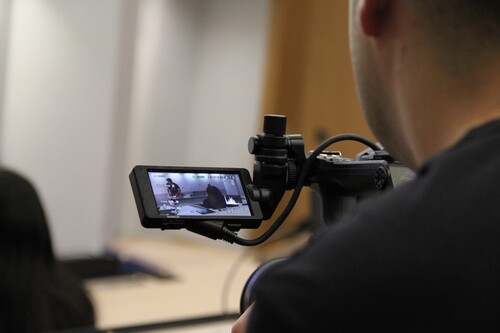A time-saving method to create teaching recordings using OBS Studio

This video demonstrates the use of some free open broadcasting software, Open Broadcasting Studio, to create recorded composite video lectures without editing. The software allows you to put together audio, video and image sources very simply and switch between several different formats live. The aim of this video is to encourage you to try to capture lectures quickly and with quality.
I have used OBS to create lectures which have a blended approach to the material without having to edit together several different audio and video sources in post-production. The software allows you to set up several different “scenes” (e.g. a full-screen view of yourself, a full-screen view of the lecture slides with your webcam in the corner, a document camera) and switch between these “scenes” live, as you record your lecture.
This method of recording lectures removes barriers to what you can show on screen and means that there is no post-production needed (unless you absolutely MUST edit out mistakes). This has allowed me to continue with my teaching style, which is improvisational and lets me pick up objects, show videos, draw diagrams without restriction and without editing. This has led me to create more interesting lectures which take the same time to prepare as when I teach them live and increases accessibility in the videos by allowing the viewer to lip-read as often as possible.
What was the impact of your practice and how have you evaluated it?
Feedback from peers and viewers has been overwhelmingly positive, but more importantly, I personally feel I am less restricted in my teaching and able to still apply a blended pedagogy which students have traditionally found engaging in module feedback.
How could others benefit from this example?
Using this software will save you time when recording lectures. It is restrictive in that you cannot pause or correct small mistakes, but this is actually a benefit as it forces you to reduce the time you spend on creating lectures. It requires absolutely no specialist knowledge to create high-quality blended resources.
By Dr Felix Janeway, F.D.Janeway@leeds.ac.uk, Education/Chemistry
